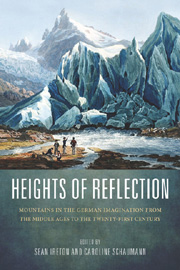 Heights of Reflection
Heights of Reflection Book contents
- Frontmatter
- Contents
- Acknowledgments
- Introduction: The Meaning of Mountains: Geology, History, Culture
- Prelude: Classical Mountain Landscapes and the Language of Ascent
- Part I First Forays: Mountain Exploration and Celebration from the Middle Ages to the Eighteenth Century
- Part II Beckoning Heights: Summits Near and Far in the Nineteenth Century
- Part III Modern Expeditions and Evocations: Climbing from the Twentieth into the Twenty-First Century
- Works Cited
- Notes on the Contributors
- Index
Prelude: Classical Mountain Landscapes and the Language of Ascent
Published online by Cambridge University Press: 05 February 2013
- Frontmatter
- Contents
- Acknowledgments
- Introduction: The Meaning of Mountains: Geology, History, Culture
- Prelude: Classical Mountain Landscapes and the Language of Ascent
- Part I First Forays: Mountain Exploration and Celebration from the Middle Ages to the Eighteenth Century
- Part II Beckoning Heights: Summits Near and Far in the Nineteenth Century
- Part III Modern Expeditions and Evocations: Climbing from the Twentieth into the Twenty-First Century
- Works Cited
- Notes on the Contributors
- Index
Summary
Let it be yours to walk in this time to the heights
— Pindar, Olympian 1A page or two into hisWhen Men and Mountains Meet (1946), the great British mountaineer of the early-mid twentieth century H. W. (“Bill”) Tilman allowed himself a rare, almost lyrical passage:
This would be my sixth visit to the Himalaya, and though occasionally I had qualms about such indulgence, I had so far managed to stifle them without any severe struggle. The appetite grows as it is fed. Like the desire for drink or drugs, the craving for mountains is not easily overcome, but a mountaineering debauch, such as six months in the Himalaya, is followed by no remorse.… Having once tasted the pleasure of living in high, solitary places with a few like spirits, European or Sherpa, I could not give it up. The prospect of what is euphemistically termed “settling down,” like mud to the bottom of a pond, might perhaps be faced when it became inevitable, but not yet awhile.
Readers of mountain literature will recognize, through the laconic wit of this post-Edwardian sensibility, one of those maddening passages that hints at but never quite explains the urge to climb. Instead, we hear the play of analogy — addiction versus muddy stagnation — to rationalize his abandonment of all good prudence: indulgence, appetite, drink, drugs, debauch, craving, relapse (“my sixth visit to the Himalaya”), remorse, pleasure.
- Type
- Chapter
- Information
- Heights of ReflectionMountains in the German Imagination from the Middle Ages to the Twenty-First Century, pp. 20 - 32Publisher: Boydell & BrewerPrint publication year: 2012


